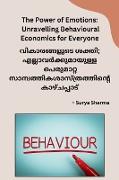The Power of Emotions
BücherAngebote / Angebote:
The Illusion of Homo Economicus: A Misconception about Humans
In the world of economics, there exists a hypothetical character called "Homo Economicus." This human form, which only considers self-interest, makes rational decisions, and acts with foresight, is the basis for economic predictions and models. However, the human beings we see in reality do not fit into this one-dimensional model. This article discusses the need to deconstruct the illusion of Homo Economicus and build an economics based on the complexities of humans.
The Role of Emotions: The assumption is that Homo Economicus operates solely on logic. However, emotions play a critical role in our economic decisions. Emotions such as fear, desire, envy, and happiness influence how we spend and invest. For example, fear of a stock market crash will lead to withdrawing investments, which can further drive the market down. Homo Economicus's model does not take into account such emotional responses, so it fails to predict real economic behavior.
The Need for a More Emotionally Intelligent Economics: The reality is that humans are complex beings who are influenced by a variety of factors, including emotions. To better understand and predict human behavior, we need to develop an economics that is more inclusive of human emotions. This would involve taking into account the following:
· The role of emotions in decision-making: Economists need to understand how emotions influence our choices, both in the short and long term. This will help them to develop more accurate models and predictions.
· The impact of emotions on the economy: Emotions can have a significant impact on the economy, both positively and negatively. For example, fear can lead to recessions, while optimism can lead to economic growth. Economists need to understand these dynamics in order to develop policies that promote economic stability and growth.
Folgt in ca. 10 Arbeitstagen


